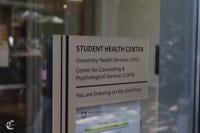In recent times, students have seemingly become less reluctant to discuss their mental health, and while the exact causes are varied, social media has played a large role in opening the floor for more conversations.
Theresa Welles said increased student willingness to talk about mental health may come from a “combination of things,” including a push from mental health professionals to counter the notion that mental health is somehow different from bodily health.
“I think it’s been a work in progress that has been successful, and I think in some ways, what really has worked is communicating about it on all different levels,” Welles said.
Welles has seen some disorders, like attention deficit hyperactivity disorder (ADHD), losing stigma as they became better understood, while others, like schizophrenia and bipolar disorder, are still less understood and more feared. However, she’s enthusiastic about the general destigmatization of mental health concerns.
“I’m really excited about the group of individuals who are talking about it, communicating, learning about it,” she said. “I think that students are some of the smartest humans we’ve had in history, and I think that they are really open to trying to connect with each other in ways that are really important.”
Welles thinks social media may have contributed to mental health discussions both positively and negatively. She said social media has allowed a broader audience to hear from people experiencing mental health struggles, and has served to normalize and validate those struggles.
“I’ve been to concerts where the lead singers have said, ‘Hey, shout out to my therapist,’” she said. “I mean, I just think overall, there’s been much more education and communication about it.”
However, Welles mentioned a need for caution regarding mental health misinformation, especially on social media.
“Again, it’s a place where most people live at some point,” she said. “It’s a place with very wide reach. Which can be great, but it’s also a place that essentially anybody can get on and discuss things, and talk about things … whether those things are true or helpful or not. So we have to be cautious, and we have to be informed consumers.”
Similarly, Stephanie Stama, assistant director for community education & outreach at Penn State’s Counseling and Psychological Services (CAPS), thinks social media has impacted discussions surrounding student mental health.
A sign for the Student Health Center hangs outside the University Health Services (UHS) building on Wednesday, Oct. 1, 2025 in University Park, Pa.
Brittain Banull
Stama said research indicates pro-social uses of social media birth positive outcomes, such as “less distress, more self-efficacy (and) better self-esteem,” by talking about topics like body neutrality and health instead of harmful ones like body image stereotypes. However, she thinks context is key when it comes to assessing the impact of social media on mental health discussions.
“We don’t want people self-diagnosing something that doesn’t need pathologizing,” she said.
Baron Rogers, a Black and African American student services coordinator at CAPS, said people go to social media to feel heard and seen, even if they find community with people they might not physically see. Rogers said there’s “a lot of research showing the importance of connection and belonging.”
He said people forming connections or finding a sense of belonging with others or “something bigger beyond them,” like nature, art or religion, provides a preventive factor for suicide risk.
However, he’s had students whose mental health has been impacted by social media apps like Tea, which lets women post information about former partners and potential ones, while also providing background checks and a sex offender map.
“I’ve had students who felt very judged going through this app and have had a lot of anxiety working through this app,” he said. “So social media can be a real double-edged sword for sure.”
In general, Rogers said destigmatization makes people more comfortable receiving help. He said talking about mental health will improve everyone’s access, which leads to more expansive and inclusive mental health care down the line.
“It kind of begets a wheel, right?” he said. “If you’re part of a very popular fast food chain, that chain grows and access to that chain grows. The more access people have to that, the better the product and the better the quality.”
Welles thinks it’s important to keep the conversation going, and said she’s seen language surrounding mental health change.
“I think language is incredibly important,” she said. “It’s one of the things that sets us apart from the rest of the animal kingdom. It’s really, really important that we’re constantly clarifying and distilling assumptions and defining what we’re meaning, and thinking about how we’re impacting those that we are talking to.”
With the increased openness of mental health discussions, Stama wants students to know when seeking help is appropriate.
The Student Health Center sits on Bigler Road on Wednesday, May 7, 2025 in University Park, Pa.
Matt Cropp
“Just because you’re experiencing discomfort doesn’t mean you have to reach out immediately for formal support,” she said. “You do need to reach out if there are deficits or problems with daily needs like hygiene, eating, sleeping, socializing, getting to classes.”
Part of being a human is getting through some things in life that cause discomfort in order to better appreciate the things that create comfort, according to Stama. She said emotions like stress may have negative reputations but can be powerful motivators, and recognizing when stress and anxiety are associated with large life events rather than clinical conditions can be helpful.
Rogers said parents and friends are not always able to help, but conversation — with friends, a
religious leader, family or the free resource CAPS Chat — are the first steps before more serious interventions.
Stama said students can do self-work by making small changes to routine and visiting the mental health section in the library. She also recommends mental-health related events, such Health Promotion and Wellness’s stress management sessions or Campus Recreation’s yoga.
“I’d encourage someone who might be more hesitant to talk about mental health to try one of these adjacent to mental health activities and test it out there,” she said. “When you’re learning to swim, you don’t need to jump in the deep end the first time.”
MORE NEWS CONTENT
Americans awaiting their monthly food-aid payments from the Supplemental Nutrition Assistanc…
If you’re interested in submitting a Letter to the Editor, click here.



